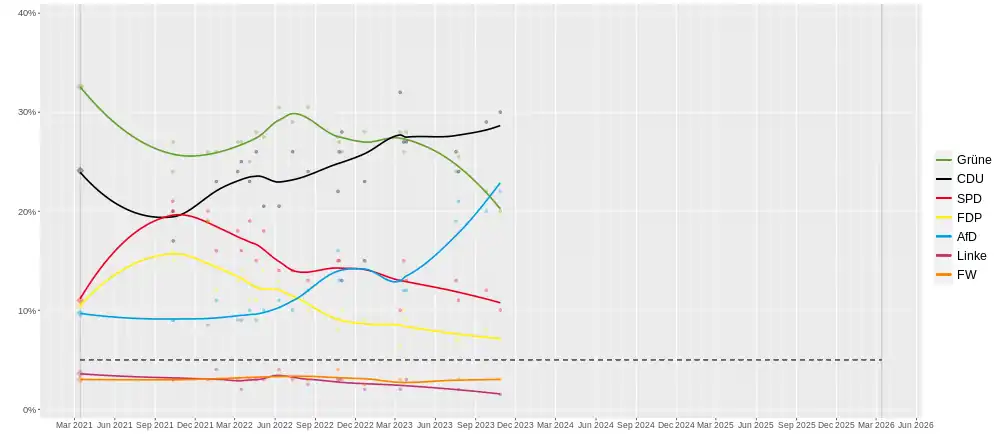| ||||||||||||||||||||||||||
All 120 seats in the Landtag of Baden-Württemberg (including any overhang and leveling seats) 61 seats needed for a majority | ||||||||||||||||||||||||||
|---|---|---|---|---|---|---|---|---|---|---|---|---|---|---|---|---|---|---|---|---|---|---|---|---|---|---|
| ||||||||||||||||||||||||||
| ||||||||||||||||||||||||||
The next election to the Landtag of Baden-Württemberg is scheduled for 2026.
Background
In the 2021 state election, the Greens, led by Minister-President Winfried Kretschmann, were the strongest with 32.6%, giving them their best nationwide result ever in a state election. For Baden-Württemberg, the CDU achieved its poor result with 24.1%, the SPD also achieved its worst result with 11%, but again became the third strongest force, the FDP achieved one of its best results with 10.5%. The AfD suffered heavy losses, becoming the weakest force in the state parliament with 9.7%.
The Third Kretschmann cabinet was formed; a Green–CDU coalition.[1]
In April 2022, the Landtag amended the state's electoral law, so that a second vote and closed list was added. In addition, the voting age was lowered to age 16.[2][3]
Opinion polls
Graphical summary
Party polling
| Polling firm | Fieldwork date | Sample size |
Grüne | CDU | SPD | FDP | AfD | Linke | FW | BSW | Others | Lead |
|---|---|---|---|---|---|---|---|---|---|---|---|---|
| Wahlkreisprognose | 23–27 Oct 2023 | 1,100 | 20 | 30 | 10 | 7 | 22 | 1.5 | 3 | – | 6.5 | 10 |
| 20 | 27 | 9 | 8 | 20 | 2 | – | 6 | 8 | 7 | |||
| Infratest dimap | 21–25 Sep 2023 | 1,162 | 22 | 29 | 12 | 8 | 20 | – | – | 9 | 7 | |
| Wahlkreisprognose | 17–24 Jul 2023 | 1,000 | 25.5 | 24 | 11 | 7 | 21 | 2 | 3 | 6.5 | 1.5 | |
| Infratest dimap | 13–18 Jul 2023 | 1,185 | 24 | 26 | 13 | 7 | 19 | – | – | 11 | 2 | |
| INSA | 20–27 Mar 2023 | 1,000 | 28 | 27 | 13 | 9 | 12 | 3 | – | 8 | 1 | |
| Infratest dimap | 16–21 Mar 2023 | 1,178 | 26 | 27 | 15 | 10 | 12 | – | – | 10 | 1 | |
| Wahlkreisprognose | 7–13 Mar 2023 | 1,005 | 28 | 32 | 10 | 6.5 | 13 | 2 | 3 | 5.5 | 4 | |
| Wahlkreisprognose | 18–22 Dec 2022 | 1,000 | 28 | 23 | 15 | 9 | 15 | 2 | 2.5 | 5.5 | 5 | |
| INSA | 24–31 Oct 2022 | 1,000 | 26 | 28 | 13 | 10 | 13 | 3 | – | 7 | 2 | |
| Infratest dimap | 20–25 Oct 2022 | 1,175 | 27 | 26 | 15 | 9 | 13 | 3 | – | 7 | 1 | |
| Wahlkreisprognose | 16–22 Oct 2022 | 1,014 | 27.5 | 22 | 15 | 8 | 16 | 3 | 4 | 4.5 | 5.5 | |
| Wahlkreisprognose | 8–15 Aug 2022 | 1,300 | 30.5 | 24 | 13 | 10 | 12 | 2.5 | 3 | 5 | 6.5 | |
| INSA | 4–11 Jul 2022 | 1,000 | 29 | 26 | 14 | 11 | 10 | 3 | – | 7 | 3 | |
| Wahlkreisprognose | 3–10 Jun 2022 | 1,000 | 30.5 | 20.5 | 14 | 13 | 11 | 4 | – | 7 | 10 | |
| Wahlkreisprognose | 5–6 May 2022 | 1,040 | 27.5 | 20.5 | 18 | 14 | 10 | 3 | – | 7 | 7 | |
| Infratest dimap | 12–19 Apr 2022 | 1,170 | 28 | 26 | 15 | 11 | 9 | 3 | – | 8 | 2 | |
| INSA | 28 Mar–4 Apr 2022 | 1,000 | 25 | 23 | 19 | 11 | 10 | 3 | – | 9 | 2 | |
| Wahlkreisprognose | 8–16 Mar 2022 | 1,600 | 27 | 25 | 16 | 14 | 9 | 2 | – | 7 | 2 | |
| Infratest dimap | 4–8 Mar 2022 | 1,152 | 27 | 24 | 18 | 13 | 9 | 3 | – | 6 | 3 | |
| Infratest dimap | 13–18 Jan 2022 | 1,166 | 26 | 23 | 16 | 12 | 11 | 4 | – | 8 | 3 | |
| Wahlkreisprognose | 23–30 Dec 2021 | 1,002 | 26 | 19 | 20 | 19 | 8.5 | 3 | – | 4.5 | 6 | |
| Infratest dimap | 7–12 Oct 2021 | 1,162 | 27 | 17 | 20 | 15 | 9 | 3 | 3 | 6 | 7 | |
| INSA | 4–11 Oct 2021 | 1,000 | 24 | 20 | 21 | 16 | 9 | 3 | – | 7 | 3 | |
| 2021 federal election | 26 Sep 2021 | – | 17.2 | 24.8 | 21.6 | 15.3 | 9.6 | 3.3 | 1.7 | 6.5 | 3.2 | |
| 2021 state election | 14 Mar 2021 | – | 32.6 | 24.1 | 11.0 | 10.5 | 9.7 | 3.6 | 3.0 | 5.5 | 8.5 |
References
- ↑ "Green-black coalition in Baden-Württemberg is in place". Der Spiegel (in German). 1 May 2021.
- ↑ Soldt, Rüdiger; Stuttgart. "Baden-Württemberg: Bläht das neue Wahlrecht den Landtag auf?". FAZ.NET (in German). ISSN 0174-4909. Retrieved 2022-10-09.
- ↑ "Gesetz zur Änderung der Verfassung des Landes Baden-Württemberg und des Gesetzes über die Landtagswahlen" (PDF). landtag-bw.de. 6 April 2022.
